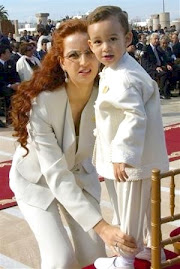16/02/2007 By Adil Dekkaki for Magharebia in Washington – 16/02/07
The Center for Strategic and International Studies has published a study on political and economic reform in Morocco and the extent to which it can be considered an exemplary model for other Arab states.
A study titled "Arab Reform and Foreign Aid: Lessons from Morocco" was conducted by the Centre for Strategic and International Studies in Washington, to evaluate the experience of Morocco in the field of economic and cultural reform. The authors of the study -- Haim Malka and John Alterman -- conducted a series of interviews with hundreds of Moroccans from various sectors, including members of the government, university teaching staff, journalists, and members of non-governmental and civil society organizations.
Evaluating reforms in Morocco
The study states that the King Mohammed VI, has embraced changes in the country's political, economic and social fields over past years. As a result, an extensive debate is currently under way in Morocco regarding democracy and power, and there is an indication that neutral reform is taking place.
The study also shows that the participation of citizens in political life has risen considerably over past years, since the scope of human rights, individual liberties and women’s rights has been widened, and journalists now are testing the limits permitted by the government in the field of freedom of opinion and expression.
There is considerable and evident consensus among different groups in Morocco that priority should be given to political reform and social change. However, the report shows that the image of Morocco is not all rosy. There is some concern over the future of the country, particularly as Morocco is suffering from difficult economic and social problems like rising unemployment, the ongoing conflict over the Western Sahara and the risk of terrorism.
The study shows the reforms that were adopted by the late king of Morocco, Hassan II, during the 1990s were all positive and noticeable developments. They did however lead to a greater consolidation of power in the hands of king than previously, instead of achieving the goal of drawing the parties and civil society organisations into the running of the country’s affairs.
The challenges and stumbling blocks experienced by the reform process and the changes in many of the Arab states over the past decades have not affected the reform process in Morocco. In the eyes of many international observers, Morocco has become an exemplary and outstanding model for Arab reform. The study attributes this to Morocco itself choosing to adopt a reform agenda, and endeavouring to obtain foreign aid, and to this reform agenda not being imposed on from the outside. Western countries efforts were not focused on launching the reform process in Morocco, but rather on encouraging a programme of reform which the Moroccan government itself originally began and pursued.
The nature of the amendments and reforms
The study indicates that it is possible to divide the latest amendments in Morocco into two basic categories. The first relates to individuals in relation to society and to the government. The amendments that were adopted within this framework include the changes to the Family Code; the formation of the Justice and Reconciliation Committee; the human development initiative; and openings in politics for Islamists and other political groupings.
The second category of reform includes the composition and functioning of the Moroccan government. Economic reforms -- privatisation, opening up economic sectors to foreign investment, relaxing the restrictions imposed on investment, reviewing the Journalism Law, and parliamentary and judicial reform -- have all been implemented.
Morocco is developing quickly with regard to reform, but the report emphasises that time will tell whether Morocco is moving sufficiently fast in this regard. It is too soon to describe the reforms adopted by Morocco as a success story -- the main indications of success will appear over the coming years.
Lessons to be learned
According to the authors, Morocco provides a valuable lesson in political and economic reform, which others in the Arab world can draw on. The Moroccan experiment in the field of reform exposes the importance of the government taking a leading role in the setting-up and managing of the reform process, since the monarchy in Morocco is the real driving force for the adoption of reforms as it made them a strategic choice for its political programme, and thus gave the process of change thrust, strength and efficacy.
The Moroccan model confirms that it is possible to adopt political and economic reform simultaneously, and that the processes of political and economic reform support and assist each other. Morocco has also proved that it is possible to accommodate Islamist movements and bring them into the political process successfully, as shown by the important experiment of the Justice and Development Party’s participation in political activities in Morocco.
An important lesson to draw from the Moroccan experiment, the study concludes, is that reform must be accompanied by a genuine domestic desire for change.
View property borders website
Saturday, 17 February 2007
Subscribe to:
Post Comments (Atom)




No comments:
Post a Comment